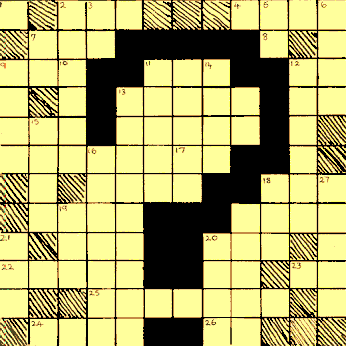| mind games |

Philip Joy considers a pair of old mind games, anagram and crossword, and finds them difficult for computers.
I HAVE decided to include details about two things, a review of two programs, which are old mind games, Anagram and Crossword. The second thing is adventure games, on which I have received some very interesting comments.
First, Anagram and Crossword, both on one cassette and sent for review. It is obtainable from Warren Newman, Greenwich, SE10. The tape arrived with a brief description about both games.
Crossword was difficult to load, with the volume level critical, but that is common and is something ZX-81 owners expect. Newman's letter says: "It is, so far as I am aware, the first electronic version of a crossword puzzle".
I am not sure about it being the first but they are not very common. One reason is that they can be done only once; apart from changing the clues and answers, nothing else can be done when you finish it. You need someone else to make up and type the crossword, otherwise you will know the answers. For the same reason you must not list the program or the answers will be shown and the puzzle ruined.
It has a fast response time, using the fast mode of the ZX-81, and uses the screen well. One point is that there is an option to display the crossword. If you did that, surely the whole puzzle would be ruined? The clues are related to ZX-81 computer terms and so will appeal to enthusiasts.
On the B side of the tape, Newman says that a standard game of Anagram is offered with three levels of play. Again, though, the game was difficult to load, but once in you can make a back-up for your day-to-day use. One thing about this type of game is that it becomes uninteresting after playing many games. Again, as in Crossword, the screen is well-used; not all games make good use of the screen but these two certainly do.
| 'Crosswords can be done only once; apart from changing the clues and answers, nothing else can be done.' |
My thanks to Newman for supplying the cassette for review. The cost is £4.95 and you will need 16K. I think it is reasonable value for money and if you like that kind of puzzle, you will like these programs. My thanks also to Leo Amatino, who looked at these games and gave unbiased remarks.
I would like to mention another game I received on tape, an "unbeatable" version of multiple-pile Nim. I say unbeatable in quotes, because no-one I have asked to play it has beaten it, including me. It has won some games and drawn some, but has not been beaten - a remarkable achievement.
With some of the rubbish programs on the market for the ZX-81, this program, I think, should be sold, but the sender has no plans to do so, so far as I know.
My favourite type of mind game is the adventure type, a game which is a total mind game like chess, but with more fun and general appeal. Adventures are the type of game in which you are projected into some castle/forest and you have to solve some problem, like finding the long-lost treasure.
Along the way there are numerous problems and each has an exceptional solution. Most microcomputer adventures have completion times of around a month.
The idea is derived from the large mainframe computers, where large disc packs are used to store the game and your progress. It is a fact that some computer centres stopped work while the workers tried to finish a problem.
Of course, the ones on microcomputers like the ZX-81 are not so complicated, but just as much fun to play, and there are many for the 16K ZX-81. They often produce much frustration but there is great satisfaction when a month of work produces a result.
Please send details of Mind Games to Philip Joy, Essex.